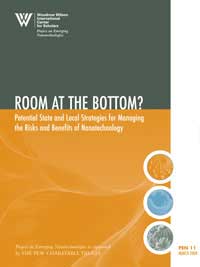Apr 10 2008
State and local governments often have adopted trailblazing initiatives to address environmental, health and safety concerns in advance or in lieu of federal action. With nanotechnology, an emerging field of science with unknown risks, this practice is continuing, a landmark study has found.
 Room at the Bottom? Potential State and Local Strategies for Managing the Risks and Benefits of Nanotechnology
Room at the Bottom? Potential State and Local Strategies for Managing the Risks and Benefits of Nanotechnology
“In the absence of action at the federal level, local and state governments may begin to explore their options for oversight of nanotechnology,” says Suellen Keiner, author of the new Project on Emerging Nanotechnologies (PEN) report, “Room at the Bottom? Potential State and Local Strategies for Managing the Risks and Benefits of Nanotechnology.” Keiner is the Chief Operating Officer of State of the USA, Inc., a new non-profit organization that is building a system of key indicators to measure economic, environmental and social conditions across the nation.
In regard to oversight of nanotechnology, Berkeley, CA, has taken the lead by adopting an ordinance that requires handlers of nanomaterials to submit toxicology reports on the materials to the city. Elected officials in Cambridge, MA, and Madison, WI, have also begun to look at similar reporting mechanisms. However, the prospect of a patchwork of state and local regulations is cause for concern among policy experts.
“The scenario of having a number of different local regulations is not ideal, but it could serve as a catalyst to force the federal government or Congress – whether through administrative regulation or legislation – to address the potential negative impacts of engineered nanomaterials,” says David Rejeski, the director of PEN.
The report discusses possible options for state and local governments to follow that would allow for oversight of the potential negative impacts of nanotechnology – including local air, waste and water regulations, as well as labeling and worker safety requirements.